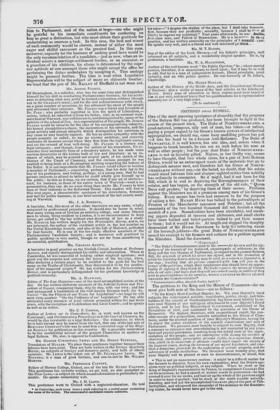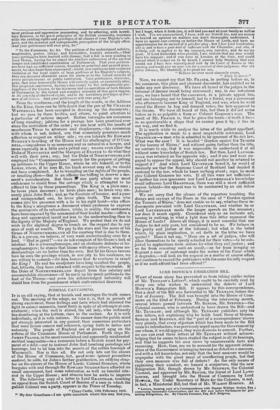SMITHSON versus RUSSELL.,
ONE of the most amusing specimens of absurdity that the progress of the Reform Bill has produced, has been brought to light in the course of the present week., The Duke of NORTHUMBERLAND, a good-natured, pompous, silly sort of man, has taken—or rather, paying a proper regard to his Grace's known powers of intellectual appropriation, we should say, some busy meddling person has put —it into his head to be a furious Anti-Reformer. The Duke of NEWCASTLE, it is well known, has one idea, and, unless when it happens to break bounds, he can see an inch before his nose as well as other people ; but the poor dear Duke of NORTHUMBER- LAND is not so lavishly gifted. Nature, in her thrifty way, seems to have thought, that two whole ideas, for a pair of Anti-Reform Dukes, would be an extravagant waste of the materials that go to distinguish meaner men, and therefore left his Grace of NORTH- UMBERLAND without any,—in the belief, no doubt, that his estate would stand between him and sharper-sighted critics than nobility has ordinarily to encounter. So it might, had it not been for the Bill, which is to end in depriving the Boroughmongers of their estates, and has begun, on the strength of the old rule, " Quem Deus vult perdere," by depriving them of their senses. Petitions against the Ministers are at a premium among men of his Grace's kidney. Every means has been had recourse to for the purpose of raising a few. HENRY HUNT has talked to the potwallopers of Preston of the Manchester massacre and Peterloo ; but all the unanimity of the two hundred thousand did not furnish a single scratch of a pen. Round-robins have been circulated, and sneak- ing papers deposited at taverns and alehouses, and small clerks have been bullied and ticket-porters bribed to put their names to them ; but it would not do. At length out stepped t he doughty descendant of Sir HUGH SMITHSON to help the tottering cause of the borough jobbers—the great Duke of NORTHUMBERLAND issued his rescript to his farmers and cottiers for a petition against the Ministers. Read the document.
" (CIRCULAR.) "The Duke's Commissioners send to Mr. —for his own and the sig.: natures of the tenants of his bailiwick, counterparts of addresses to the King and the two Houses of Parliament, in respect to the present Reform Bill, the originals of which his Grace has signed, and in the promotion of which his Lordship desires activity may he used, as a return is expected in a few days ; trusting that all persons connected with him will join in the prayer of the petitions, which their neighbours also should have an oppor- tunity of signing if they think fit. The Duke requires the names of tenants who do not sign ; and hopes that they will not embark rashly in politics if they wish to place confidence in his opinions, WHICH CAN ONLY BE TRULY LEARNT THROUGH HIS COMMISSIONERS.*
"Commissioners-office, Alnivick Castle, April 5."
The petitions to the King and the House of Commons—for we must give both acts of the farce—are as follows :
"To the King's Most Excellent Majesty, &c. We, your Majesty's loyal subjects, the undersigned nobility, magistrates, gentry, clergy, and free- holders of the county of Northumberland, beg leave most humbly to as- sure your Majesty of our unfeigned attachment to your Majesty's Royal person, and to our free Monarchical Gpvernment, established at the Revolution of 1688, and confirmed by the accession of the House of Brunswick. We deplore, therefore, with proportioned regret, the pos- sible success of a proposition, recently submitted to the House of Com- mons, under the avowed sanction of your Majesty's Ministers, having for its object the entire abolition of the ancient constitution and uses of Parliament. We presume most humbly to suggest to your Majesty, that a measure so extensive and overwhelming is not warranted by any prac- tical and proved grievances, resulting from the actual state of the repre- sentation of the people ; and we contemplate with dismay the sacrifice of chartered, statittable, prescriptive personal rights, to a capricious innova- tion, which in its immediate or ultimate results must impair the dignity of the imperial crown, destroy the harmony of our mixed legislature, and esta- blish a dangerous precedent for the confiscation of private property, and the subversion of public institutions. We therefore most humbly pray, that your Majesty will be pleased at once to discountenance, or annul, this
• This is not an unnecessary caution : it might be a difficult matter for the farmers to discover, from his own explanation, what the Duke's opi- nions were on political subjects, or any subject. When he went as the King of England's representative to France, to compliment CHARLES Dix on his accession, be had a speech of sixteen words to pronounce—he had conned it over for six weeks, and had sat up the whole of the previous night in order to have it perfect ; but he stuck at the ninth vocable notwith- standing, and had not the accomplished CHARLES played the part of Flib- bertigibbet, and whispered the remainder of the sentence to the flounder- ing orator, he would never have got to the end.
most perilous and oppressive proceeding, and by adhering, with heredi- tary firmness, to the great principles of the British monarchy, maintain alike the existing rights and privileges of all classes of your Majesty's sub- jects, and the essential and indispensable prerogative of the kingly office. And your petitioners will ever pray, &c." • "To the Commons, &c. &c. The petition of the undersigned nobility, magistrates, gentry, clergy, and freeholders, humbly showeth,—That your petitioners have learned with dismay, that a Bill is now pending in your House, having for its object the absolute subversion of the ancient usages and established constitution of Parliament. That your petition- ers have had no sufficient reason, founded on practical and proved griev- 'ances, for this hazardous experiment ; whilst, in a capricious and summary violation of the legal rights of large portions of his Majesty's subjects, they can discover abundant cause for alarm as to the future security of every private tenure or public institution. Your petitioners, therefore, 'pray, that your honourable House will entirely reject, or essentially alter, this proposed enactment, having a due regard to the indispensable pre- rogatives of the Crown, to the harmony and co-operation of both Houses of Parliament, to the varied and complex interests of this great empire, to the sanctity of chartered rights, and to the hereditary privileges of free- men of all classes. And your petitioners will ever pray, &c."
From the wordiness, and the length of the words, in the Address . to the King, there can be little doubt that the pen of Sir CHARLES :WETHERELL has been occupied in drawing up the documents ; but we pass by these levities, and others, to point attention to a particular of serious import. Rotten boroughs are nuisances of long standing; jobbing for a peerage has been practised ever since the institution of the order; we can bear with the insults of mushroom Twiss to attornies and shopkeepers,—his connexion with whom is not, indeed, one that commonly generates much affection or respect on either side ; we can tolerate Sir EDWARD SUGDEN'S bearding of the House and his challenging of O'CoN-
i
NELL,—impudence s so necessary and so natural in a lawyer, and more especially in a little and a petted one ; we can even allow the Duke of NEWCASTLE and the Marquis of EXETER to do what they will with their own ; nay, had the Duke of NORTHUMBERLAND employed his " Commissioners " merely for the purpose of getting up petitions to the Upper House, where he sits himself, or to the Lower, where, if he sees fit, his black servant may sit, we should not have complained. As to trampling on the rights of the people, or insulting them—that is an offence too trifling to deserve a mo- ment's consideration. But there PP one party whom we must endeavour to shield from the outrage which is attempted to be offered to him by these proceedings. The King is a plain man ; he loves plain manners ; he loves plain men; • he loves very sin- cerely plain John Bull ; and, as the fountain of honour, and a pure and unimpeached one, he loves plain truth. The man who comes into his presence with a lie in his right hand—who offers to the King's acceptance a document which professes to express the sentiments of its subscribers, while, in reality, the sentiments have been imposed by the command of their feudal master—offers a deep and aggravated insult not less to the understanding than to the dignity of the Majesty ofEngland. We protest that we do not wish in the slightest degree to trench on the respect due to any man of rank or wealth. We pay to the stars and the acres of his Grace of NORTHUMBERLAND all the courtesy that -is due to them. He is a person, we believe, of very weak understanding even for a lord. " God is great !"—we do not complain of his Grace's lack of intellect. He is a boroughmonger, and an obstinate defender of bo- roughmongers ; he shares that blame with many others, whose un- derstandings are no better than his own. But let his Grace beware how he uses the privilege which, in our pity to his weakness, we are willing to concede—let him beware how he ventures to insult the King ! He and his coadjutors have long insulted the people, but, hitherto, they have refrained with respect to the monarch. If the Duke of NORTHUMBERLAND depart from this salutary and commendable observance—if he carry up his mock petitions to the foot of the Throne—not even his acknowledged imbecility will shield him from the punishment which such conduct deserves.



























 Previous page
Previous page